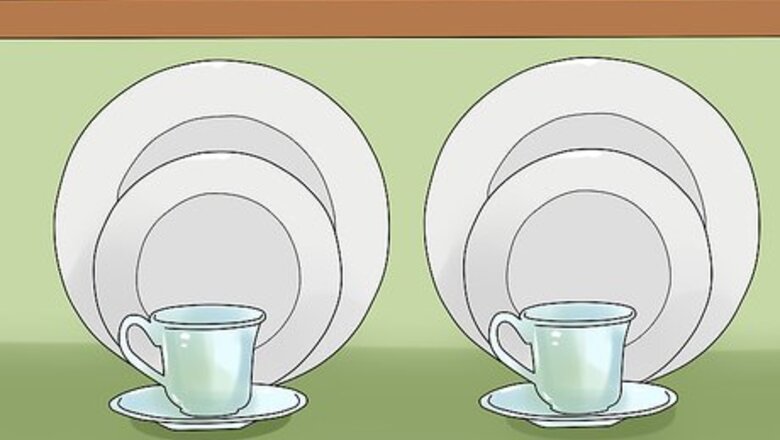
views
Choosing What to Put in the Cabinet
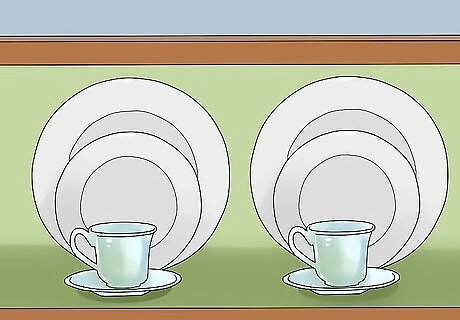
Show off a single setting or two of your nice china. If you want to show off your china but you don't want to put all of it out, try just displaying 1 or 2 settings. Use plate holders to prop the plates upright, and place the setting in a prominent place in your hutch. You can also set the silverware on a napkin in front of the china, plus add a teacup on a saucer. Hang the plates on the wall above the hutch or set tea cups on a shelf in the hutch if you want to display your china in a new way.
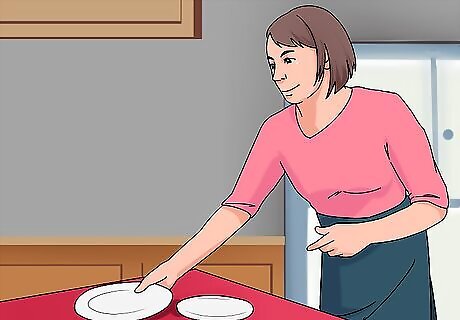
Use it to house your regular dishes if you don't use your china much. If you don't use your fancy dishes very much, consider using your hutch to display your everyday dishes. It will make setting the table easy, and then you can keep your china in an area that won't gather as much dust. Think about putting the majority of dishes on 1 shelf near the bottom so they don't take over the whole decorative space. You may want to display dishes that are all the same color if the hutch has glass doors or panels.
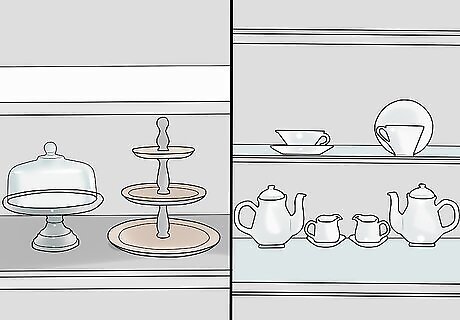
Pick a theme you love. Choosing a theme helps unify your hutch. For instance, maybe you want to use it to display your cake stands. Alternatively, maybe you want to show off your teacup and teapot collection. Whatever you love, use that as a theme for your hutch.
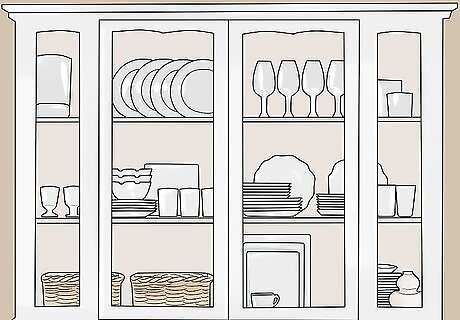
Choose a color scheme for a cohesive look. To create a cohesive look, you can use a color scheme for the objects you place inside instead of a theme. Pick 1 or 2 colors, such as a neutral color and a bright color or white and a metallic color, and only use items in that color scheme. If you're not sure what colors you want, start with an object you love and use that to build your color scheme. Use the same color or theme already present in your dining room for a cohesive look.
Arranging Your Items
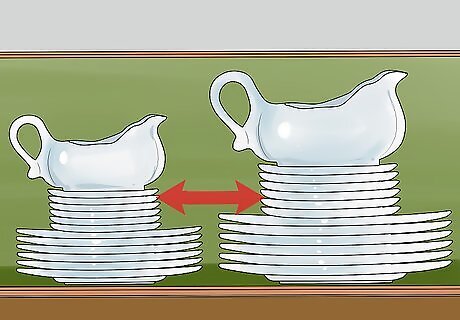
Give your items space. If you highlight some of your favorite pieces and use some negative space around them, your display area will have more of an impact. In other words, don't overload the decorative space. Too many items in the display area will be too much to take in at once. Just pick a couple of large pieces that you love. Place them in various places on different shelves and add other smaller items in between. Leave some extra space around the items so the display won't be visually overwhelming. Display large or unique items front and center. Or, set them on a stack of books so they are higher than the other pieces.
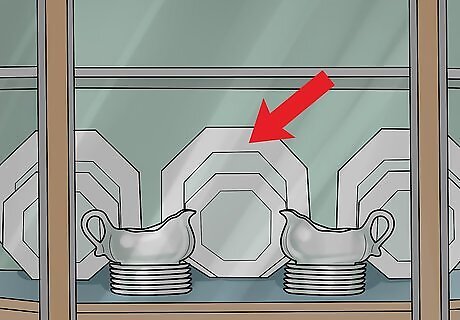
Place larger items in the back. Think about decorating your hutch like you'd line up people for a picture. You want the taller things in back so they can be seen. Plus, having tall items in back and shorter ones in front creates layers to your decorating.
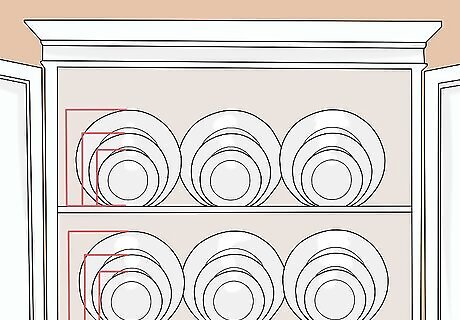
Create visual interest with varying heights. Just a tall row and a short row of decorative items would create a very boring display. Instead, include items of different heights to make it more interesting. Just to be sure to follow the rule of placing the largest items in the back, so you can see the shorter items up front. You may have 2 or 3 sizes of "large" items in the back, and several sizes of shorter items in the front. Also, balance the area. You don't want to put several large pieces next to each other on 1 shelf and then have another shelf with all tiny objects. That will look unbalanced. Instead, make sure to scatter your large and small objects throughout to make it more visually appealing.
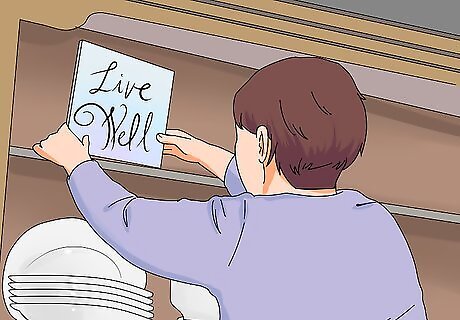
Set up vignettes. If you look at your hutch, you'll likely notice individual spaces delineated by the shelves and glass panes. Use those areas to set up little vignettes. Think about it like telling a story. Use each little area to tell its own story by balancing objects in it you love. When creating vignettes, use 3 items to create visual balance. They can be 3 different objects, 3 different styles, or 3 different colors.
Finishing off the Look
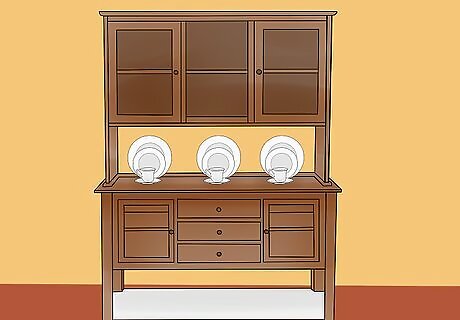
Ensure the display flows naturally with other decor in the room. When decorating a hutch, think about the decorations in the surrounding area. You don't want the items in the hutch to stick out like a sore thumb. Rather, you want them to blend into the area naturally. Make sure you're continuing the themes from the hutch out into the room, and vice versa. For instance, if you chose a blue and white theme for your china cabinet, you may have an issue if the rest of the room is a clashing purple. Make the hutch blend in with the space by using the same styles and colors used in the rest of the room.
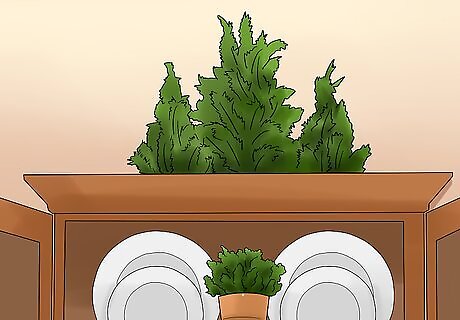
Keep the top simple. While it can be tempting to throw things on top of the hutch in an effort to decorate the hutch, that can be a bit too much. If you want to decorate the top, do it sparsely, such as using an evergreen branch around the holidays. Adding too much on top can make the whole thing feel too cluttered. Plus, the items up there will likely just get dusty.
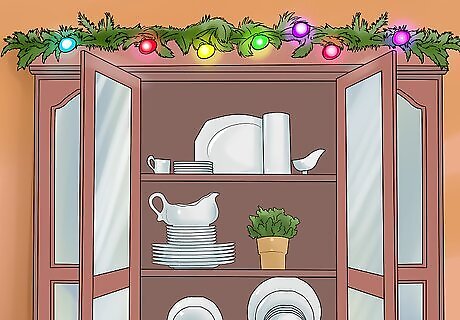
Introduce decorations for the holidays. Spruce up the cabinet by tucking in a few decorative items. For instance, at Christmas, you could add a few evergreen branches and a couple of sparkly ornaments around the items in the hutch. At Valentine's Day, you could throw in a few glitter hearts and red-and-white-striped straws in the cups. Don't go overboard. A few touches here and there is more than enough to celebrate a holiday.
Painting a Hutch
Clean the hutch. Start by thoroughly cleaning all the surfaces on the hutch. Before you paint, you want to start with a clean surface. Use an all-purpose cleaner to wipe down the surfaces, and then use a damp rag to wipe off the cleaner. If there is a good amount of grease, you may need a higher powered cleaner like trisodium phosphate.
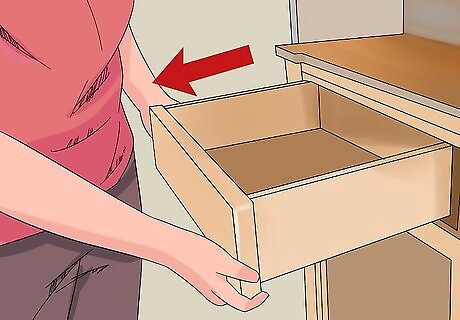
Remove the hardware. To make it easier to paint the hutch, take the handles off by unscrewing them. You can also remove the glass or tape around the glass if you plan to leave the glass in the hutch instead of replacing it. Also, take out the drawers and remove the doors to make them easier to paint. You'll likely need a phillip's head screwdriver for the task.
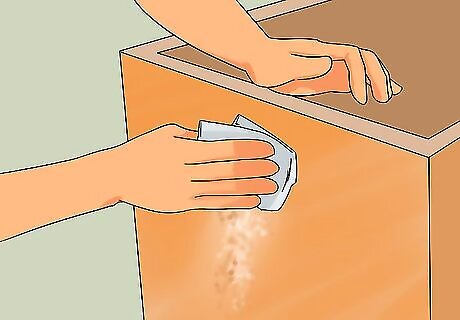
Sand it down. Use a medium-grit sandpaper to go over the whole hutch. Doing so will help remove some of the seal or paint below, creating a better surface for painting. Wipe it down afterwards to remove any dust. Some primers don't require sanding, but check the package before deciding not to sand.
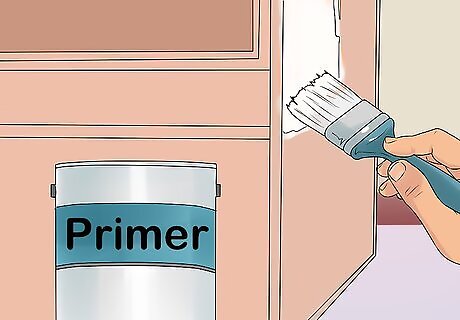
Use a primer to thinly cover all the areas you're going to paint. If you are not using a paint that includes a primer, it can help to begin with a primer. Pick a primer designed for furniture, which will help the paint adhere to the piece. Use a paint brush to give the hutch a thorough coat.
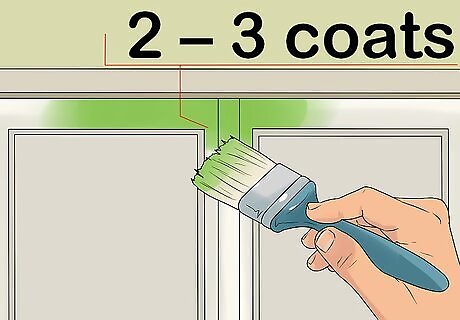
Apply 2 to 3 coats of interior paint. Use an interior paint in the color of your choice. Using a paint brush, apply a single coat of paint to the hutch, including the drawers and doors, and let it dry. Apply another 1 to 2 coats, depending on how well the paint covers. Allow it to dry between coats.
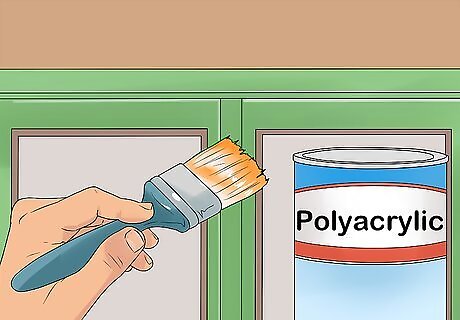
Use a sealer for extra protection. China hutches can see some wear and tear, so if you want to add another layer of protection, apply a sealer such as a polyacrylic. You'll need to apply a couple of layers, letting it dry between layers.
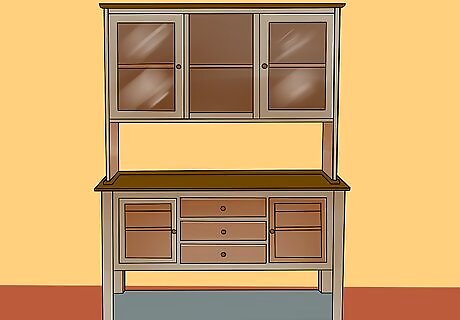
Put the hutch back together. Once the hutch is completely dry, put the pulls, latches, and hinges back on. Reattach the doors to the hutch and put the drawers back in.




















Comments
0 comment